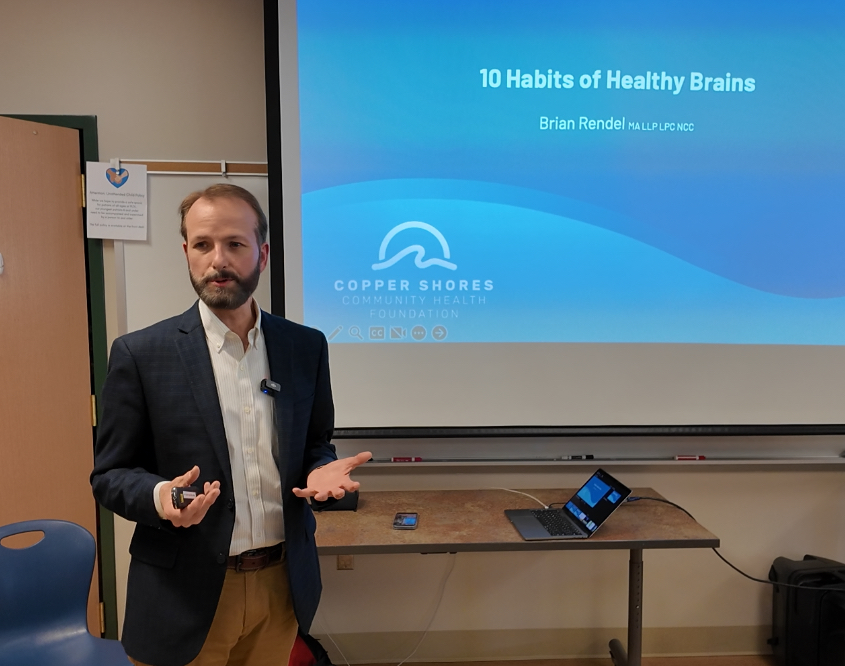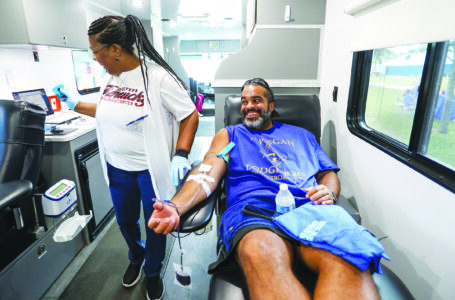Expert emphasizes adopting 10 habits of healthy brains

Courtesy of Brian Rendel Brian Rendel speaking at last week’s Mental Health Awareness Month program
We’ve all heard about some of the habits that promote good mental health: enough sleep, nutritious foods, exercise. Those are important, but there are others, too.
At a Mental Health Awareness Month program last week, Brian Rendel discussed 10 Habits of Healthy Brains. Rendel is a licensed professional counselor with more than 30 years of experience in the mental health field. He is program director of community counseling and wellness at Copper Shores Community Health Foundation.
The Mental Health Support Group-Keweenaw Area sponsored the event, partnering with Portage Lake District Library.
Our brains and bodies must work together to achieve good mental health, Rendel said. You can’t just focus on one or the other.
He used the analogy of a diseased tree leaf. A tree expert might study the spots on the leaf without examining the whole tree. The roots or the trunk might be diseased. The tree may be planted in the wrong kind of soil or might not be getting the proper nutrients. Focusing just on the spots on a leaf won’t reveal that.
Like the tree, people’s mental health issues may be related to underlying physical problems such as poor nutrition or sleep, toxins or stress.
Too many health professionals are laser-focused on a symptom or diagnosis.
“Diagnoses are just labels,” Rendel said. “We need to look at the roots of the problem.”
Rendel described 10 habits of healthy brains:
• Annual check-ups by health professionals
• Good sleep
• Cardiovascular and resistance exercise
• Foods that support brain functioning
• Avoiding or limiting toxins
• Practicing gratitude
• Practicing mindfulness
• Practicing psychological flexibility
• Embracing struggle
• Identifying your five core values, then aligning your life and making decisions based on them.

Courtesy of Brian Rendel
Your brain can act as a shock absorber.
Rendel explained the importance of each habit.
Annual medical check-ups can identify physical problems, while a good report can reassure you about your physical health.
Enough deep, restful sleep will enable your brain and body to repair themselves.
Cardiovascular and resistance exercise three or four times a week helps your heart, lungs and circulatory system. It also helps keep your muscles and joints in good working shape.
“Sleep and exercise are pretty powerful medicine,” Rendel said.
We have become a society that lives on fast food, processed food, foods loaded with sugar, fat and additives. Eating healthy food feeds your brain as well as your body.
Some products we eat, use or inhale contain toxins that can undermine our physical and mental health. Read labels and choose products with no toxins or as little as possible.
Mindfulness, such as meditation, walking in nature, listening to gentle music or just slowing down can act as a shock absorber for your mind.
Practicing gratitude can change your outlook on life. Be grateful for the air we breathe, connections with people, groups like this — the little gifts we often take for granted.
Psychological flexibility can enable you to explore beliefs other than your own and eliminate all-or-nothing thinking.
As for embracing struggle, Rendel quoted a psychologist he knew who asked his clients: “Do you want to feel better, or do you want to get better?” Getting better is hard work but worth it.
Identifying and then living by your most important values can simplify the challenges of making decisions and deciding how you want to behave.
“What are your five core values?” Rendel asked. “Prioritize them, then ask, ‘How will this decision or behavior serve my core values?'”
He summarized his view of mental health: “Living a life of meaning and purpose, with a sense of movement toward one’s potential.” The 10 habits for healthy brains can help get you there.
Representatives of five local mental health support groups also described the work their organizations do. They were: Mental Health Support Group-Keweenaw Area, Keweenaw Support 4 Healthy Minds, Copper Country Community Mental Health, Unite Mental Health and Wellness, and Copper Shores Community Health Foundation.
Editor’s note: Jennifer Donovan is a member of the Mental Health Support Group-Keweenaw Area.






